
Water ATMs create a splash
By Catherine Jewell, Communications Division, WIPO
When it comes to access to clean drinking water the statistics are stark. Every 21 seconds a child dies from a water-borne illness. Some 783 million people around the world still lack access to clean water and are vulnerable to water borne diseases, including diarrhea, the leading cause of illness and death. Improved access to sanitation and clean drinking water could reduce diarrheal diseases by nearly 90 percent, saving lives and lifting the burden they place on the health budgets of developing countries.
Providing drinking water via a piped grid especially to remote rural locations is costly and often not an option in many developing countries. Sarvajal, an Indian social enterprise, offers an alternative. Rather than transporting water to communities from external sources, Sarvajal sells an integrated water purification service that purifies and monitors the quality of local water sources for local consumption, creating local jobs and income in the process. WIPO Magazine recently met with Sarjaval’s Chief Operation Officer, Anuj Sharma, to find out more both about how the company is expanding access to clean drinking water and the role that IP plays in supporting this goal.

Water for all
Sarvajal, which means “water for all” in Sanskrit was established as a social enterprise in 2008 by the Piramal Foundation to find ways to provide reliable and safe drinking water to poor communities living in remote villages and urban slums. Some 97 million people living in India continue to lack access to clean water and are at risk of contracting waterborne diseases, which account for over 50 percent of illnesses requiring medical treatment. “If we were going to make any progress in reducing the burden of disease, it was clear we had to address the issue of water. Providing healthy drinking water is one of the most effective health initiatives,” Mr. Sharma said.
Developing a workable solution was no easy task. Sarvarjal faced a number of challenges, not least poor roads and intermittent power supplies. Although there were a number of water purification technologies available on the market, the company recognized from the outset the need to develop a financially viable and sustainable business model that could be scaled up. “What was missing was a viable business model that offered incentives for people to provide water to an expanding number of households,” Mr. Sharma said.
A technology-enabled solution
To fill this gap, Sarjaval developed a technology-enabled franchising model. This model, not only facilitates the delivery of clean water to an expanding number of households, but also generates employment and income-earning opportunities for people in the communities it serves.

Sarvajal’s Water ATM™ is a low-cost, solar-powered,
self-contained water vending machine that stores
clean water and can be re-filled by the nearest
franchisee.Uptake of Sarvajal’s low-cost water
delivery solution has been rapid. The company
now has 154 franchisees on its books and delivers
clean water to over 100,000 people.
Much to its surprise, Savarjal found that households in target communities readily understood the link between clean water and health. Although people were unaccustomed to paying for clean water, the advantages of obtaining it for US$0.005 per liter (which was cheaper than any other outlet) were crystal clear, not least because up to 40 percent of annual household income went towards paying medical bills for water-related ailments.
Income-generating opportunities
Sarvajal adopted a franchising model as it believed this would allow it to truly penetrate local markets. It created a network of suppliers by signing franchising agreements with local entrepreneurs who were much better placed to set-up and run these businesses than Sarvajal was, as an outsider. In effect, these franchisees act as community water stewards. They pre-pay Savarjal for the technology to filter water locally and sell it on to customers. The franchising model also proved a useful means of retrieving and managing the multiple cash payments generated by the sale of clean water.
“We operate a hub and spoke system,” Mr. Sharma explains, “we work with local entrepreneurs, provide them with our water purification technology and support them in maintenance and other back end services. We also help with community awareness so they hit the numbers they need to make their businesses viable,” he explained.
The uptake has been rapid. The company now has 154 franchisees on its books and delivers clean water to over 100,000 people every day.
Driven by its vision to make clean water readily available to even the remotest rural hamlets, the company developed the Water ATM™, a low-cost, solar-powered, self-contained water vending machine which stores clean water and can be re-filled by the nearest franchisee. “The metaphor of the ATM is very powerful,” Mr. Sharma said. Customers buy a pre-paid smart card, which can be easily topped up using a mobile phone, they swipe it across a sensor on the machine to get information about the quality of the water and their credit balance. They select the amount of water they need and fill their containers. The Water ATM offers consumers around the clock access, seven days a week, to the quantities of clean water they need, significantly reducing the time spent on water collection; time which can devoted to exploiting other income-generating opportunities. The Water ATM also proves an attractive business opportunity for the franchisees that operate them.
Monitoring water quality
If something goes wrong with one of the ATMs, Savarjal is informed immediately thanks to its customized enterprise resource planning (ERP) system, SEMS™, that manages water businesses from source to consumption. The system integrates Sarvajal’s cloud-based Soochak™ system, which monitors the status of its reverse osmosis and ultra-violet filtration units, and the Water ATM™ with service, maintenance and supply chain operations. “To overcome all the problems we faced, we have developed an integrated remote sensing-enabled purification system that controls price, vouches for water quality and closes down the supply when the quality is not sufficient,” Mr. Sharma explained.
Sarvajal’s multiple water filtration system removes 99.9 percent of germs and ensures that minerals, such as fluoride which can be harmful in excess, fall within recommended levels. “Our system reduces the risk of unsafe water and saves on maintenance costs,” Mr. Sharma said.

Women are generally responsible for water collection. Mothers and
daughters spend on average 2 hours per day – up to 700 hours per year –
collecting water from bre holes or delivery locations. Sarvajal’s
technology-enabled franchising model delivers clean drinking water to the
last mile, enabling women to focus more time on childcare,
income-generating activities and education.
The system also makes it possible for the community to pool and reuse water resources. “It is a 100 percent water efficient system at the community level. Our model is water table friendly. There is no need to take water from one point and sell it elsewhere at prices that are inflated by fuel costs,” Mr. Sharma said explaining that because of erratic power supplies, a standard household water purification system typically only uses a third of its capacity.
Maintaining water quality is critically important to Sarvajal and is one of the reasons for its strong commitment to protecting its intellectual property (IP). “We need to safeguard against someone copying our system and delivering a substandard service that causes harm,” Mr. Sharma said.
The role of IP
Driven by the belief that “IP can help deliver low cost services,” the company recently obtained a patent on its system, in India and the United States. Sarvajal’s entrepreneurial ethos means that its focus is on driving down costs while maximizing impact. “We established as a private company so we had the discipline that revenue drives. Every experiment you do has to have bang for the buck thinking behind it,” he said. “It also forced us to come up with better deals and to look at technology as an investment. Technology made the system possible and has driven down maintenance costs,” he noted, explaining that the company’s smart thinking had enabled it to reduce the cost of producing its machines by two-thirds.
“IP can help deliver low cost services,” Mr. Sharma stated, explaining that while the company was open to sharing its technology to advance its social goals, it would defend its rights against anyone seeking to exploit underserved communities. “It is inevitable that in future someone will find a way to deliver water to the same quality of water at a lower price. We have no argument with that because it means it will be possible to reach more people. Our goal is to be financially sustainable, not ultra-profitable, but if someone copies our system and uses it to charge much higher rates, we will not be happy.”
Sarvajal sees IP as a means of safeguarding its long-term viability, “without IP, a company may not survive. IP is very important because it gives credibility,” Mr. Sharma noted. This is key in terms of attracting and satisfying customers’ needs for a consistently high-quality service, recruiting local franchisees and persuading banks to offer them loans to set-up or expand their business. It is also critical in engaging the support of municipal authorities, which is a pre-requisite to serving these communities. “Governments and big philanthropic organizations want to ensure that their money is not being wasted and that the target population is being served with clean drinking water,” Mr. Sharma explained. “The real-time data that our system generates makes this possible. Once you have the technology it is a matter of production and getting a certain buy in from the government side.”
Sarjaval’s experience demonstrates how IP can be used to make progress in tackling some of the tough development challenges facing countries around the world. Its technology-enabled business model is already generating tangible health benefits, environmental dividends and economic opportunities within communities at the bottom of the social pyramid.
Within the next year, Sarvajal plans to deliver clean water to at least 1 million additional households around the country and is currently in discussions with city authorities to establish its service within poor urban areas in New Delhi. Its decentralized integrated water purification services promise to have a huge impact on the health and quality of life of millions of households in underserved areas.
The WIPO Magazine is intended to help broaden public understanding of intellectual property and of WIPO’s work, and is not an official document of WIPO. The designations employed and the presentation of material throughout this publication do not imply the expression of any opinion whatsoever on the part of WIPO concerning the legal status of any country, territory or area or of its authorities, or concerning the delimitation of its frontiers or boundaries. This publication is not intended to reflect the views of the Member States or the WIPO Secretariat. The mention of specific companies or products of manufacturers does not imply that they are endorsed or recommended by WIPO in preference to others of a similar nature that are not mentioned.